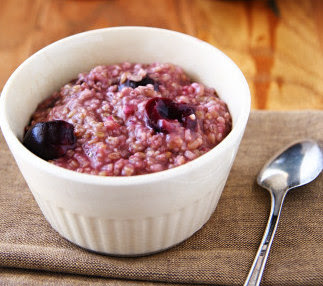One of my nutritional heroes is John McDougall. John is a medical doctor in the US who believes passionately in the power of plant-based diets, not only to prevent but to treat all manner of chronic diseases.
He has been studying, writing and challenging the accepted wisdom on the effects of nutrition on disease and health for over 30 years. Together with his wife, Mary, he runs ten-day residential programmes in California designed to help people transform their health and well-being by changing their diet and lifestyle. Many people report recovery from supposedly incurable conditions as a result of following this programme.
Recently I was looking through one of my McDougall cookbooks and noticed a recipe for cashew nut milk. So I decided to use this to make a warming and delicious oat porridge with blueberries and raisins for my breakfast.
Oats have many health benefits (1). They provide one of the richest sources of the dietary soluble fibre beta-glucan. They also contain more lipids (5-9%) than other cereal crops and are rich in unsaturated fats, including the essential fatty acid linoleic acid. Oats also contain unique antioxidants, called avenanthramides, as well as the vitamin E-like compounds, tocotrienols and tocopherols.
The ability of oats to lower total and LDL cholesterol is well-documented, however, they provide cardiovascular benefits that go way beyond their cholesterol-reducing properties. Accumulating evidence from epidemiological, clinical, and animal studies suggests that fibre sources, including oats, can significantly aid in reducing blood pressure and/or prevent the onset of hypertension. Katz et al reported that a single serving of oatmeal could oppose the disturbances in endothelial function observed after the consumption of a high fat meal; this may reduce the likelihood of arterial damage and heart disease (2).
Soluble fibre from oats, when incorporated into a low-glycaemic diet, can help to regulate blood glucose and insulin response after eating. More than 12 published studies report that oats, consumed as oat bran, oatmeal, or isolated beta-glucans, reduce both fasting and postprandial blood glucose and insulin levels (1).
It seems that news of the health benefits of oats is spreading as Quaker have reported a dramatic increase in sales since 2009.
So here is the recipe I followed. Enjoy!
Ingredients
- 1 cup whole oat groats
- 6 cups water
- 50g (2oz) cashew nut pieces
- 350ml (1.5 cups, 12 fl oz) water
- 1/2 cup blueberries
- 1 dessert spoon raisins
Method
- Place whole oat groats in a pan with 6 cups water, bring to a boil, turn down the flame as low as it will go and simmer with the lid on for 2 hours until the oats are soft, white and glutinous. You can do this the night before, cool the cooked oats and store in the fridge. You can also use ordinary instant porridge oats; use about 30g (4-5 dessert spoons) per person.
- Place the cashew nuts with 350ml water in a blender and process until the liquid appears milky and smooth. Add the blueberries and raisins and blend.
- If using the cooked oat groats, take about one-third of the amount you have prepared or the quantity you want, add 1 cup of the cashew, blueberry and raisin blend and cook for a few minutes until hot. Serve with some whole fresh blueberries. If you are using the instant porridge oats, add the cashew, blueberry and raisin blend in a ratio of 1 part oats to 2 parts liquid and simmer until the oats thicken. Serve with some fresh blueberries.
If you have enjoyed this post and would like to keep in touch please sign up for my free email newsletter.
You can also follow me on Facebook, Twitter, Pinterest and LinkedIn and visit my website.
You can also follow me on Facebook, Twitter, Pinterest and LinkedIn and visit my website.
References
(1) http://roscomoss.com/pdf/HealthBenefitsofOats.pdf
(2) http://www.jacn.org/content/23/5/397.full.pdf

No comments:
Post a Comment